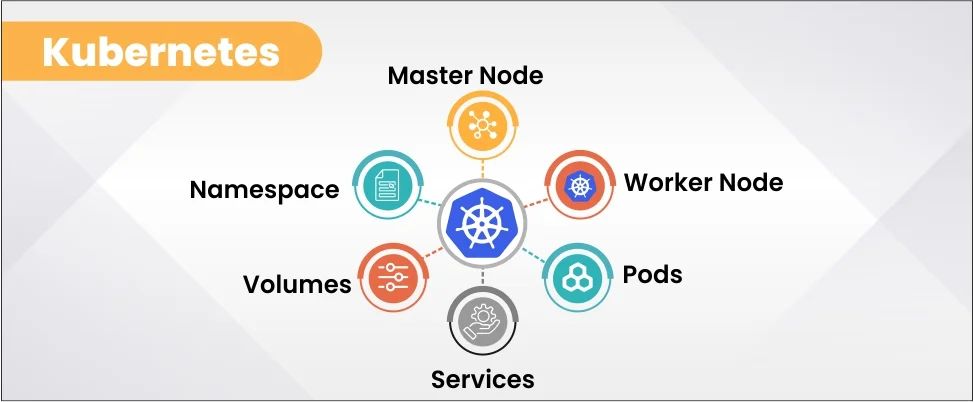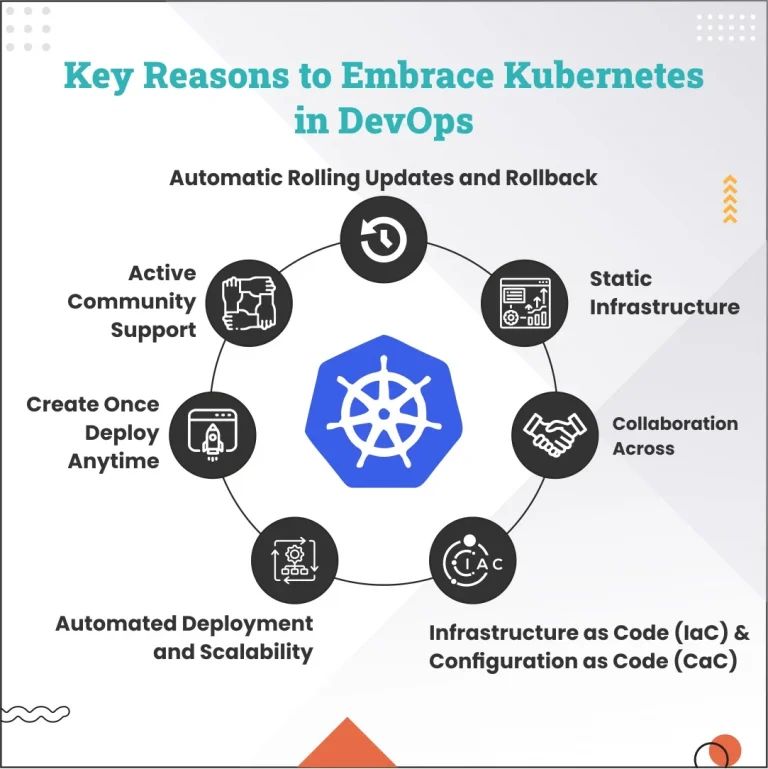Table of Contents
ToggleIntroduction
Decades ago, the deployment of applications required lengthy commands and instructions. However, there has been a paradigm shift in containerization tools. And this has made Kubernetes one of the star platforms in the DevOps environment. In this article, we will take you through the top 7 reasons that makes Kubernetes important for DevOps.
What is Kubernetes?

Kubernetes also known as K8 is one of the leading open-source container orchestration platforms available today. It provides the framework to scale and automate the software deployment. Moreover, it also manages containerized applications in a dynamic containerized environment. The following are some of the main components of Kubernetes:

- Master Node: It looks after the cluster scaling and scheduling with the help of the API server, Controller Manager, and Scheduler.
- Worker Node: This executes the container applications by using Kubelet Service and Kube-proxy Service.
- Pods: They encapsulate one or more containers that share the same network, and make a fundamental scheduling unit in Kubernetes.
- Services: It is a technique that provides stable IP addresses to the Pods running in the cluster of Kubernetes.
- Volumes: It offers a plugin mechanism to connect the temporary containers with persistent data storage.
- Namespace: It organizes clusters into virtual sub-clusters to offer a valuable solution for the usage of the same cluster into multiple teams.
Take control of your career and land your dream job!
Sign up and start applying to the best opportunities!

What is DevOps? What Role does Kubernetes play in DevOps?

DevOps merges the development and operation teams as one. It combines tools and processes through a newly created system called pipelines. This approach provided teams with better collaboration as well as efficiency.
Initially, organizations started using DevOps when they faced some challenges in managing different tools in one pipeline. To overcome this challenging phase, they began to pack pipeline components into containers. This is where Kubernetes comes into the picture. Kubernetes plays a crucial role in managing containers in the pipeline. How?
Kubernetes containers are nothing but self-sufficient packages of code that are necessary to run applications. By using this, Kubernetes breaks down the system into smaller chunks of microservices. Organizations that use Kubernetes have full flexibility in controlling the automated pipelines. Besides, Kubernetes service types are ClusterIP, NodePort, Ingress, and Load Balancer, which simplify communication and networking within the Kubernetes culuster. Now that you know how Kubernetes simplifies the process in DevOps environments. Let’s dive into the 7 reasons why Kubernetes is an important DevOps tool.

- Automatic Rolling Updates and Rollback: Usually traditional method takes the application offline whenever an update goes on. This significantly results in downtime due to which the application remains unavailable to users. Whereas Kubernetes’ automatic update technique eliminates this downtime in a matter of seconds. But that’s not all, its automatic rollback technique does not let anything go wrong during the update process. This feature acts as a fail-safe mechanism by quickly recovering the working state without extended time. Besides, its ability to handle traffic and a one-time cluster-a-time approach ensures smooth maintenance and reduces downtime in cloud environments.
- Infrastructure as Code (IaC) and Configuration as Code (CaC) : Kubernetes defines the application IaC using YAML files without manual interventions. Also, it offers benefits such as version control, scalability, and reproducibility. While CaC ensures that the development, staging, and production have a similar setting. By doing so, management and deployment of applications across various environments becomes way easier. Kubernetes then allows developers to link their application’s source code with the repository.
- Static Infrastructure: Whenever there is a need to update, fix, or change, it does not modify the existing containers. Instead, it generates a new set of containers. These containers play a vital role in replacing outdated or unhealthy ones with new ones. Kubernetes architectures offer benefits like automation, high availability, portability, load balance, and extensibility. As a result, it makes the cloud environment more resilient and stable.
- Collaboration Across Function: Kubernetes allows collaboration across functions by using role-based access controls. This feature not only simplifies the collaboration between the functions but also maintains the reliability and consistency of resources and configurations. Meaning, Kubernetes only allows testers to focus on one task by restricting access to other components. On the other hand, for customer access, it sets the limits to review and deployment. Because of this control system, smooth cross-function collaboration technique is possible while at the same time protecting the system’s integrity.
- Automated Deployment and Scalability: Kubernetes schedules the automated container deployment across different servers, whether they’re in the cloud, virtual machines, or physical machines. Whenever it encounters the heavy usage of CPU or sudden custom metrics, the auto-scaling feature increases or decreases the number of containers automatically. Likewise, it automatically scales down when the extra capacity is not needed and saves the resources. Not only does it scales resources up and down but allows trouble-free horizontal and vertical scaling.
- Create Once Deploy Anytime: This is the vital feature of Kubernetes in the DevOps environment. This feature lets developers create a container image that can work the same way on the server or computer regardless of where you are using it. This consistent behavior of the container is an added advantage for the DevOps environment.
- Active and Support Community: The large active community provides support to developers to create a hybrid-friendly model, through which developers can add their own data on-premises and let them use the cloud-based resources too. Moreover, the platform comes with an open service standard which keeps data secure.

Don't miss out on your chance to work with the best!
Apply for top job opportunities today!
Final Words
So, we have let the cat out of the bag! Now you are also aware about why DevOps developers rave about Kubernetes’ flexibility, compatibility, and automated technique all the time. Kubernetes is not an option for the DevOps tool but a boon. If you are a Kubernetes Developer looking to work with top global companies, then sign up with Olibr now!
FAQs
DevOps unifies the process of workflow and promotes collaboration using shared pipelines. This approach ensures quality and efficiency in software deployment.
Kubernetes breaks the dependencies of package application code by simply letting the DevOps team build flexible and portable pipelines. That results in easier management of containerized applications and automates the lifecycle of the container.
The automation method simplifies the infrastructure and configuration of code as well as the management of setup.
Kubernetes allows the IT team to focus only on managing clusters, monitoring security, and disaster recovery. Whereas application teams handle deployments of applications and create container images.
A pod is the smallest unit that is used to run applications. Each contains a unique IP address, and the same pod in one container can communicate with each other using localhost.
Azure Kubernetes Service offers simple container-based application deployment and management and reduces the complexities associated with traditional self-hosted AKS clusters.

